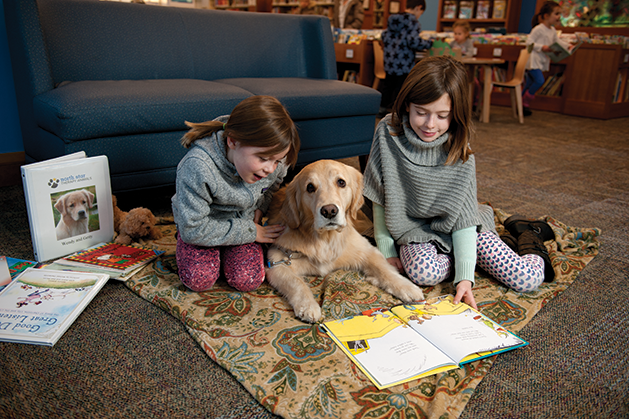
Minnetonka resident Wendy Hitch is one of six founding members of North Star Therapy Animals (NSTA). These original members had all been involved in another therapy animal reading program, but wanted to form a new nonprofit group aimed solely at providing therapy animal teams and services to Twin Cities facilities. NSTA was born in 2007 as an all-volunteer organization and has grown to over 125 members today.
“Once we became a nonprofit and got a website, that’s when all the action started, because facilities [in need of therapy animals] can go on the website and make a request,” Hitch says. The requests are numerous and diverse. To try and meet the demand, members set up booths at events and pet food stores to recruit people who are interested in volunteering with their animals. “We’re telling people about what we do, but it’s also encouraging people, because it’s a huge, growing industry—everybody wants therapy animals. We can fulfill maybe half the requests we get.”
All NSTA therapy teams are registered with Pet Partners, a national organization based in Seattle offering a protocol for becoming a registered therapy animal, providing members with insurance and requiring them to retest with their animals every two years. “That’s a big deal because it keeps you professional, on your toes. The evaluation involves roleplay of situations you’d find yourself in with your dog, and you develop with your animal a very close bond where they look to you a lot for direction,” Hitch says.
NSTA members visit sites from schools to hospitals to the airport. The overall goal is to provide connectedness with the people they visit, and this looks different in each place. At schools and libraries, the Read With Me and Reading Education Assistance Dogs programs provide the framework. Members work with their pets to give kids an audience for reading aloud. “Children want that time with the dog so they’ll read for a longer time because they get to be with the dog. They’ll snuggle up and it’s something special, so it’s an enrichment activity for them,” Hitch says. A program at the University of Minnesota called Pet Away Stress does exactly what its name implies. At hospitals, treatment programs, rehab centers, hospices, airports and prisons, the volunteers and their pets help people unwind.
Hitch volunteers with her golden retriever, Getty. “A lot of it is listening to people just say what they need to say, tell you about their dogs and while they’re petting your dog they’re just feeling better. The floodgates can really open, too. I’ve had a number of people at the airport just come up to her, put their head on her forehead and they’ll start to cry. It’s just so many different lovely little things that the dogs bring out. It’s very sweet. They’re little miracle makers,” Hitch says. The therapy pets are mostly dogs, but also include cats, guinea pigs and even a miniature horse.
“I love volunteering. When you volunteer with your animal it’s like the frosting on the cake,” Hitch says. “It’s really just the whole beauty of the comfort and joy they bring, and the stories that result because of the way people relate to them.”
People can volunteer on their own with their pets, but NSTA offers a community for those who want it, holding monthly meetings, bringing in speakers and having a summer picnic. It also offers a way for members to connect with facilities that are seeking volunteers.









